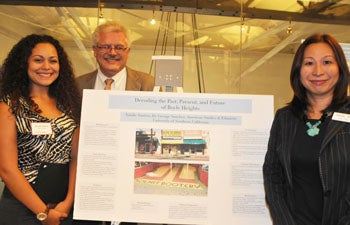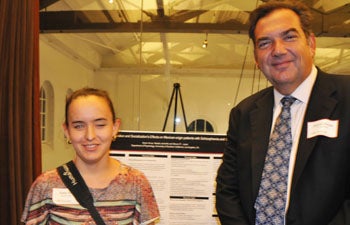Limitless Potential
Feeling her notes, her fingertips following lines of raised dots, Karen Arcos eloquently spoke about her research on schizophrenia before an audience at USC’s University Club.
The psychology junior shared her work during the HSBC Fellow Research Presentation on Sept. 9. Arcos is among HSBC Bank fellows for first-generation and underrepresented students seeking to develop career skills through research and faculty mentorship.
Each of the 13 USC Dornsife fellows received $1,000 during the 2012–13 academic year and $3,000 over the summer to fund her or his research project.
“On behalf of HSBC, we’re honored to support such outstanding students at such a great school,” said William Ozaki, vice president/global relationship manager at HSBC’s Los Angeles office and an alumnus of the USC Thornton School of Music. “USC and HSBC share the same values. At HSBC, we have main values that guide our business: being dependable, doing the right thing, being open to different cultures and ideas, and connecting with the community.
“Since 2008, HSBC has been proud to partner with USC on various scholarships, and provide research funding for deserving students.”

Natalie Santizo, a psychology and sociology junior, decoded the past, present and future of Boyle Heights, Los Angeles. She stands at her poster with her faculty mentor George Sanchez and Lilly Tung, vice president/cluster manager at HSBC Bank.
Arcos is one such deserving student. Born premature weighing one pound, two ounces, doctors suspect the oxygen that kept her alive for her first three months detached her retinas in both eyes, leaving her completely blind. Half Columbian and half Mauritian, she is a first-generation college student. An exceptional scholar, her award-winning research examined Latino schizophrenics and their caregivers.
Acculturation, Arcos said, affects how family caregivers treat their patients. Developing research shows that Mexican American caregivers are more involved in their patients’ lives than Anglo American caregivers.
After analyzing interviews, Arcos found that the moderately and highly acculturated families saw the caregiver-patient relationship more positively than the less acculturated. Some saw a mutual benefit between caregiver and patient. “Él viene siendo como mis manos,” one stroke victim said of his schizophrenic son, translating to, “He has become like my hands.”
She embraced the opportunity to conduct this research under the guidance of Steve Lopez, professor of psychology and social work at USC Dornsife, who attended the event. The experience has made Arcos realize her potential.
“Earning an HSBC fellowship reaffirms my belief in persevering no matter what,” Arcos said. “Dr. Lopez’s mentorship has motivated me to continue believing in myself and to give back to others. Participating in this research has broadened my horizons about what psychology has to offer and has exposed me to a population I would have otherwise known about only on the surface level.”
After the presentations, HSBC representatives met the fellows, who elaborated on their research standing next to their posters. Some fellows were accompanied by their faculty mentors. Such was the case with Shawn Rhoads, a junior majoring in physics and psychology. His faculty mentor, Edward Rhodes, professor of astronomy, was present when his student described his research on temporal changes in solar pressure oscillations.
Melvin Earl Villaver Jr., a junior majoring in sociology, was accompanied by one of his faculty mentors, Shana Redmond, assistant professor of American studies and ethnicity. A Filipino American hip-hop artist, Villaver analyzed “black music” as it relates to black migration, Filipino migration, Los Angeles neighborhood formation, public school systems and the history of hip-hop.
Katrina Kaiser recently earned her bachelor’s in economics at USC Dornsife and is now pursuing her master’s in economics at USC Dornsife. She continued Professor of Economics Jeffrey Nugent’s previous research examining the Egyptian economy since the 2011 Arab Spring. Nugent attended the event.
“For the past several summers, I’ve had to work full-time, so winning this scholarship allowed me to focus on my passion, on my research,” Kaiser said. “It was also a treat to meet other social justice-minded students who prioritized community well-being and history in their research, and to see how we all gained new skills.”
Fellow Eduardo Milliedo-Pinon went to high school at Foshay Learning Center, a few blocks from campus. He participated in the USC Neighborhood Academic Initiative (NAI), a program preparing students for higher education. A comparative literature major, his research studied how the use of video can engage new audiences for orchestra and operatic performances.
Some fellows were also members of USC Posse, which supports less advantaged students from their senior year of high school throughout college and into the workforce, said George Sanchez, professor of American studies and ethnicity, and history, and vice dean for diversity and strategic initiatives at USC Dornsife.

In her research, fellow Karen Arcos found that the moderately and highly acculturated Latino families taking care of their schizophrenic relatives saw the caregiver-patient relationship more positively than the less acculturated. Arcos is joined by Andrew Hietala, senior vice president and relationship manager at HSBC Bank.
Sanchez was faculty mentor to several fellows. One, Anneleise Azua, a double major in gender studies and communications, explored issues of folklore, healing and gender in the traditional South Texas healing practice of curanderismo. Roxana Ontiveros, a political science and Chicano studies junior, studied the rich Jewish history of Boyle Heights, Los Angeles. Yet another, Natalie Santizo, a psychology and sociology junior, decoded the past, present and future of Boyle Heights.
The HSBC program’s main faculty organizer, Sanchez spoke at the event and presented the fellows with certificates of completion.
“We want this program to provide research experiences for students interested in developing skills for their future academic and career successes, whether or not that includes a graduate program,” Sanchez said. “These students represent the present and future of our demographic reality, and the success of our regional economy is highly dependent on having well-trained professionals from these groups emerge as world leaders.”
For example, he said, Arcos strengthened and directed her already uncanny listening and note-taking skills. She uses an electronic portable note-taking device that allows keyboard entry in braille. Those skills greatly benefited the many interviews she completed for her research.
“Karen was able to use skills she had already developed in a way that gave her ideas for her career,” Sanchez said. “It opened up more possibilities.”